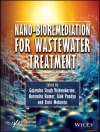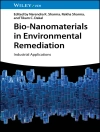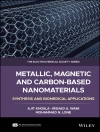The book series ‘Polymer Nano-, Micro- and Macrocomposites’ provides complete and comprehensive information on all important aspects of polymer composite research and development, including, but not limited to synthesis, filler modification, modeling, characterization as well as application and commercialization issues. Each book focuses on a particular topic and gives a balanced in-depth overview of the respective subfield of polymer composite science and its relation to industrial applications. With the books the readers obtain dedicated resources with information relevant to their research, thereby helping to save time and money.
Summarizing all the most important synthesis techniques used in the lab as well as in industry, this book is comprehensive in its coverage from chemical, physical and mechanical viewpoints.
This book helps readers to choose the correct synthesis route, such as suspension and miniemulsion polymerization, living polymerization, sonication, mechanical methods or the use of radiation, and so achieve the desired composite properties.
Cuprins
Preface XI
List of Contributors XIII
1 Synthesis of Polymer Nanocomposites: Review of Various Techniques 1
Joel Fawaz and Vikas Mittal
1.1 Introduction 1
1.2 Synthesis Methods 4
2 Masterbatch Approach to Generate HDPE/CPE/Graphene Nanocomposites 31
Ali U. Chaudhry and Vikas Mittal
2.1 Introduction 31
2.2 Experimental 33
2.3 Results and Discussion 37
2.4 Conclusions 47
3 Preparation and Applications of Hydroxyapatite Nanocomposites Based on Biodegradable and Natural Polymers 51
Pau Turon, Luis J. del Valle, Carlos Aleman, and Jordi Puiggali
3.1 Introduction 51
3.2 Preparation of HAp Nanocrystals 52
3.3 Preparation of HAp Nanocomposites 58
3.4 Applications of HAp/DNA Nanocomplexes as Gene Carriers 61
3.5 Tissue Engineering Applications of HAp Nanocomposites Based on Biodegradable Polymers 65
3.6 Applications of HAp Nanocomposites Based on Biodegradable Polymers as Drug Delivery Systems 72
3.7 Miscellaneous Applications of HAp Nanocomposites Based on Biodegradable Polymers 76
3.8 Concluding Remarks 79
4 Synthetic Methods for Nanocomposites Based on Polyester Resins 87
Michal Kedzierski
4.1 Introduction 87
4.2 Nanocomposites with Zero-Dimensional Nanofillers 89
4.3 Nanocomposites with One-Dimensional Nanofillers 93
4.4 Nanocomposites with Two-Dimensional Nanofillers 97
4.5 Conclusions 109
5 Synthesis Fabrication and Characterization of Ag/CNT-Polymer Nanocomposites 115
Vijaya K. Rangari and Sanchit Dey
5.1 Introduction 115
5.2 Experimental Procedure 118
5.3 Results and Discussion 119
5.4 Conclusion 127
6 Preparation and Characterization of PVDF-Based Nanocomposites 131
Derman Vatansever Bayramol, Tahir Shah, Navneet Soin, and Elias Siores
6.1 Synthesis of Poly(vinylidene fluoride) (PVDF) 131
6.2 Structure and Piezoelectric Properties of PVDF 131
6.3 Processing of PVDF for Energy Harvesting Applications 137
6.4 Processing of PVDF Based Materials: Polymer/Polymer, Polymer/Nanofiller, Polymer/Ionomer Blends 138
6.5 PVDF Based Nanocomposites for Energy Harvesting Applications 139
6.6 Conclusion 140
7 In Situ Thermal, Photon, and Electron-Beam Synthesis of Polymer Nanocomposites 145
Luana Persano, Andrea Camposeo, Anna Maria Laera, Francesca Di Benedetto, Vincenzo Resta, Leander Tapfer, and Dario Pisignano
7.1 Introduction 145
7.2 Thermal-Assisted In Situ Synthesis: Material Choice and Nanocomposite Characterization 146
7.3 Fabrication of Nanocomposites and Patterning 155
7.4 Conclusions 171
Acknowledgments 172
8 Synthesis of Polymer Nanocomposites by Water-Assisted Extrusion 179
Naima Sallem-Idrissi, Michel Sclavons, and Jacques Devaux
8.1 Introduction 179
8.2 Nanocomposites Structure and Characterization 180
8.3 Nanocomposites Preparation 183
8.4 Nanocomposite Properties 195
8.5 Toward Fully Green Composites? 198
9 In Situ Preparation of Conducting Polymer Nanocomposites 211
Liping Yang, Cher Ling Toh, and Xuehong Lu
9.1 Introduction 211
9.2 In Situ Preparation of Conductive Nanocomposites 219
9.3 Challenges and Outlook 233
10 Near IR Spectroscopy for the Characterization of Dispersion in Polymer–Clay Nanocomposites 241
Ana Vera Machado, Joana Margarida Barbas, and Jose Antonio Covas
10.1 Introduction 241
10.2 Morphology and Properties 241
10.3 Preparation Methods 243
10.4 Characterization Techniques 243
10.5 Dispersion by Melt Mixing 247
10.6 Online and Inline Monitoring of Dispersion 249
10.7 Conclusions 259
11 Synthesis of Polymer Nanocomposites in Supercritical CO2 267
Yuvaraj Haldorai and Jae-Jin Shim
11.1 Introduction 267
11.2 Background on Supercritical CO2 268
11.3 Physical and Chemical Properties of sc CO2 270
11.4 Preparation of Polymer/Inorganic Filler Nanocomposites in Supercritical CO2 272
11.5 Conclusions 286
References 286
Index 291
Despre autor
Vikas Mittal is an Assistant Professor at the Chemical Engineering Department of The Petroleum Institute, Abu Dhabi. He obtained his Ph D in 2006 in Polymer and Materials Engineering from the Swiss Federal Institute of Technology in Zurich, Switzerland. Later, he worked as Materials Scientist in the Active and Intelligent Coatings section of Sun Chemical in London, UK and as Polymer Engineer at BASF Polymer Research in Ludwigshafen, Germany. His research interests include polymer nanocomposites, novel filler surface modifications, thermal stability enhancements, polymer latexes with functionalized surfaces etc. He has authored over 40 scientific publications, book chapters and patents on these subjects.












